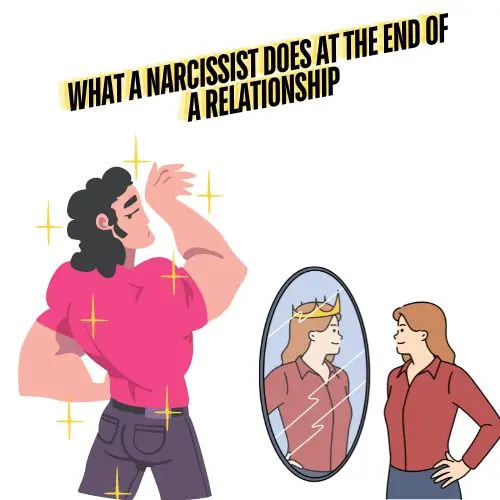Introduction
If you break up with a narcissistic partner, there is a possibility that you may become very upset and angry in the process. Such persons have weak egos and always require constant approval from their partners, making them feel important as well. The end of a relationship deprives the narcissist of all approvals, which makes him/her feel angry, guilty and empty.
This article will examine some of the common things that narcissists do when they end a relationship. It will explain why they behave like this and how to prevent further abuse during or after the breakup. When you realize who these egoistic people are, you stop taking their attacks personally to move on with your life.
Table of Key Facts:
- Around 1% of the general population has Narcissistic Personality Disorder (NPD), though milder forms of narcissism are more common
- Narcissists often idealize their partners at the beginning of a relationship but devalue them over time
- When a relationship ends, a narcissist may react with anger, blame, threats or attempts to undermine their ex-partner’s credibility.
- No contact is usually the healthiest approach after breaking up with a narcissist to avoid further emotional abuse.
- It can take time to recover from the effects of a narcissistic relationship, such as low self-esteem, anxiety or trust issues.
Breaking the News

The first challenge is actually informing the narcissist that the relationship is over. Due to their need for control and fear of abandonment, they will likely resist the breakup news and try to alter their decision. Some common tactics include:
- Love Bombing: Showering you with attention, affection and promises to change to win you back. This is just a manipulation tactic rather than genuine personal growth.
- Gaslighting: Denying or distorting what they said or did to make you doubt your own reality and memories of their abusive behaviors.
- Playing the Victim: Acting devastated by the breakup news and blaming you for all the problems in the relationship rather than taking accountability.
- Threats: Threatening to hurt themselves, damage your property or spread lies about you if you go through with the breakup.
Standing your ground during this initial confrontation is important. Do not get sucked back into their promises or warped perspective. Remain calm, firm and consistent that the relationship is over.
The post-Breakup
Once they accept the relationship has really ended, the narcissist will likely shift gears into a new reaction: anger and retaliation. They feel entitled to your constant devotion and view the breakup as a personal rejection, an attack on their ego and a loss of their main supply source. Here are some common post-breakup behaviors:
- Smear Campaign: Spreading lies about you to mutual friends, family, and social circles to discredit and undermine you. They want to paint themselves as the victim.
- Hoovering: Attempting to reel you back in with love bombing, manipulation or promises. This is usually just a tactic to regain control rather than repair the relationship.
- Stalking: Showing up uninvited, excessive contacting/texting, monitoring your online activity or location through spy apps or GPS. They want to intimidate/frighten you into getting back together.
- Harassment: Engaging in behaviors meant to annoy, distress or torment you, such as threatening messages, slander on social media, or damaging your property.
- Triangulation: Badmouthing you to new romantic partners or friends to isolate you socially and look like the “good guy” in every story.
- Discarding: Acting like you never mattered to them and quickly replacing you to protect their fragile ego from the perceived abandonment.
- Playing the Victim (still): Continually blaming you for everything rather than acknowledging any wrongdoing or issues within themselves.
No Contact is Critical
Due to their volatile emotional state, controlling mindset, and need to damage your reputation, remaining in no contact is usually the healthiest approach after a breakup with a narcissist. Block them on all communication channels and avoid giving in to hoovering attempts. Narcissists will try to get a reaction out of you or make you question yourself. Staying no contact deprives them of this power and control over your emotions.
Though the breakup fallout can seriously impact your mental health, keeping them blocked prevents further abuse. Document any harassment as evidence in case legal action needs to be taken regarding stalking or slander. Over time, their fury will fade as they find new targets. You can properly heal and move on from the relationship with no contact.
Why do Narcissists React This Way?

To understand their toxic behavior, it’s important to remember that narcissists have an unstable and fragile sense of self. Their identity revolves around perceived external factors such as status, beauty or a romantic partner to validate them. Losing the relationship means losing their main source of constant admiration and sense of self-worth.
Psychologically, several self-defense mechanisms kick in when their worldview shatters:
- Fragile Ego: Deep down, they feel shame about their core emptiness and flaws. A breakup is seen as a personal attack threatening that fragile ego. Retaliation helps restore the ego.
- Entitlement: Narcissists believe they deserve endless devotion and are owed something by everyone, especially former partners. The breakup violates that entitled mindset.
- Rejection Sensitivity: Due to childhood wounds, they live with a pervasive fear of rejection or abandonment. The breakup triggers primal abandonment anxiety.
- Lack of Empathy: Because they only care about their own needs, narcissists are incapable of understanding or caring about the damage they inflict on others with their behavior.
- Impaired Object Permanence: Due to mental splitting, former partners are viewed as all “bad” once they leave. Their positive qualities get discarded and replaced with hatred.
- Addiction to Adoration: They are psychologically addicted to constant admiration and external validation to feel good about themselves. The breakup threatens that addiction.
Understanding the psychological roots can help prevent taking their unhealthy responses to endings personally. Their reactions tend to say more about their internal deficits than about you as an ex-partner. Staying no contact is safest for your personal well-being and prevents further supply for their addiction.
The Recovery Process
Healing from the trauma of being in a relationship with a narcissist takes time. Even with no contact, expect some lingering effects on your self-esteem, ability to trust or anxiety levels. The recovery journey is different for everyone but usually involves:
- Self-Care: Prioritize your mental health through stress relief activities, therapy, social support and reading on trauma recovery. Give yourself grace through setbacks.
- Personal Growth: Work to undo any conditioning from the relationship that impacted your standards, boundaries or sense of worth. Strive to love yourself fully again regardless of others’ approval.
- Life Adjustments: Alter social media privacy or block them entirely for safety. Inform people they may reach out with lies and smear campaigns against you.
- Therapy: Speaking with a counselor trained in narcissistic abuse empowers you with coping strategies and helps overcome any lingering unhealthy patterns adopted by the narcissist.
- Time: Abusive relationships take 2-5 years or more to get over, on average. Focus on personal growth one day at a time rather than checking in on them. The urge fades with no contact.
- Forgiveness: Of both yourself for staying and the narcissist for their behavior. Holding onto bitterness will not undo the damage but prevents moving on. Forgive at your own pace.
With active recovery work, you will gain clarity, rebuild your sense of self and learn from the experience to avoid falling prey to manipulative people in the future. Focusing inward on your growth will allow the narcissist’s energy to stop haunting you over time. You deserve health, fulfillment and authentic love that brings out the real you.
Conclusion
Ending a relationship with a narcissist is an ordeal that takes time to process. Their behavior after the breakup aims to regain control or damage your reputation to protect their fragile ego. It’s crucial to maintain no contact, document any harassment and not internalize their toxic actions which stem from deep psychological wounds within themselves rather than authentic reflections on you as a person. With self-care, support and therapy, survivors can overcome effects of narcissistic abuse and come out the other side empowered with wisdom and boundaries. Stay strong during this hurtful time – their abandonment issues are not your responsibility to manage or cure. You deserve healthy love and true partnership going forward.

